Healthcare app development plays a crucial role in optimizing service quality for the healthcare industry. As the industry advances, the demand for technology integration grows. It is projected that by 2025, the healthcare app market could exceed $300 billion.
Therefore, if you are still deciding whether to develop an app for your healthcare service business model, now is the most suitable time. In the following article, let’s explore the various types of healthcare app development services, their benefits, and the process of creating them to stay ahead of the latest technological trends in the healthcare field.
What is A Healthcare App?
Healthcare apps are simply mobile applications created to meet the specific needs of the healthcare industry. They come in various types, from basic to professional, serving different purposes.
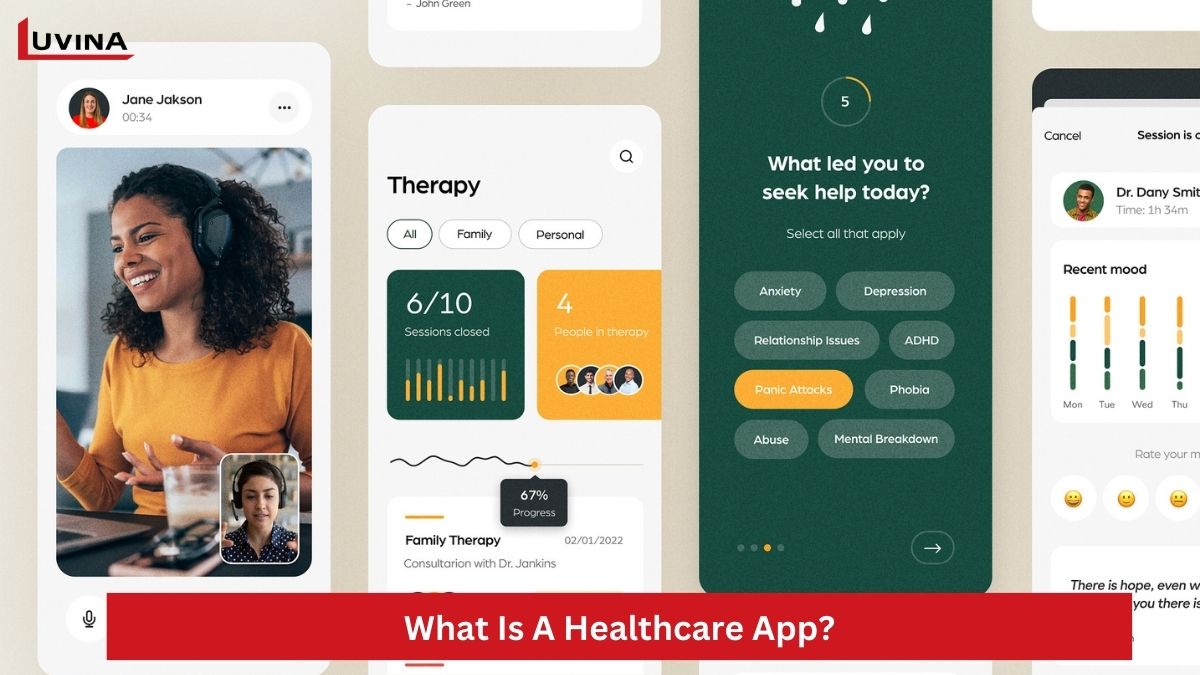
Healthcare app development creates useful tools that contribute to simplifying life. These apps not only track patient health data and ensure remote support but also share tips for improving health.
Healthcare App Development vs. Medical App Development
Both healthcare app development and medical app development services aim to improve healthcare services. However, the processes of developing these two types of apps still have differences in specific goals, nature of data, legal requirements, and target users.
While healthcare app development services provide health solutions for all communication devices and smartphones, medical app development services create mobile software for use by healthcare professionals in medical operations. For example, nutrition tracking apps, physical activity trackers, meditation, and yoga apps are considered healthcare apps. On the other hand, medical apps include applications such as patient data management, remote patient monitoring, etc.
To understand the detailed differences between healthcare mobile app development services and medical app development services, let’s explore the table below.
| Healthcare App Development | Medical App Development Services | |
| Goals | Improve healthcare systems and services; Enhance support for managing medical information; Facilitate administrative tasks | Focus on diagnosis, medical treatment, and patient information storage |
| Target users | Everyone: patients, administrative staff, insurance companies, healthcare service providers,… | Medical professionals, patients, and researchers. |
| Features | Electronic health record, health tracking, appointment scheduling, etc. | Remote monitoring tools, medication reaction checking… |
| Regulations to comply with | Compliance with healthcare regulations such as HIPAA, FDA, etc., for medical device applications. | Adherence to general healthcare regulations, medical device regulations, and clinical standards. |
| Data security | The level of security required is not as high as for medical apps. | Handling confidential, sensitive data, requires strong, stringent data security measures. |
| Cost and development time | Lower cost, and shorter development time compared to medical apps. | Requires more time and cost. |
Benefits of Healthcare Apps for Doctors and Patients
Healthcare app development aims to target a wide range of user groups. Therefore, developing healthcare software brings benefits to various stakeholders, including both patients and physicians.
For physicians, healthcare apps assist this professional healthcare team in:
- – Making quicker and more informed decisions.
- – Providing more accurate diagnoses for treatment planning, timely visits, and improving patient care outcomes.
- – Reducing stress and fatigue by eliminating manual tasks.
- – Facilitating better communication, connection, and information exchange among healthcare professionals.
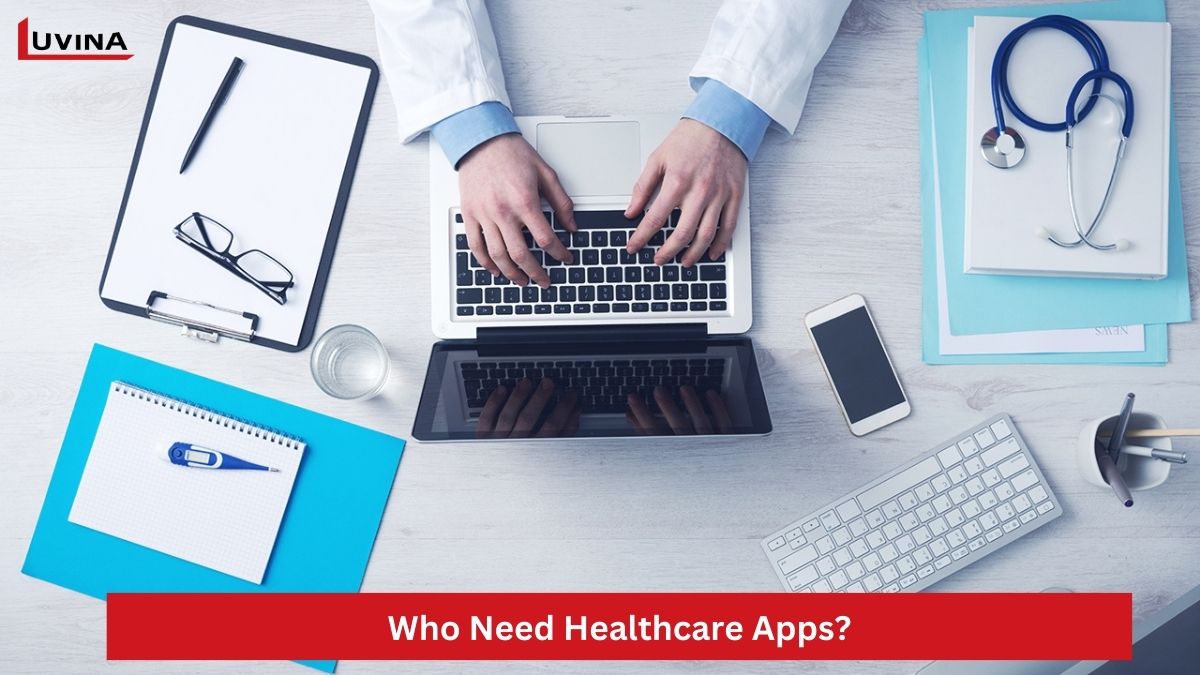
Especially for healthcare service providers, healthcare apps help reduce service costs and streamline hospital and medical device management.
On the other hand, healthcare app development services also benefit patients. Now, with the support of modern technology, patients receive better care with personalized care programs, and service delivery speeds up. Additionally, healthcare apps serve as tools for patients to monitor their health status through health data.
Types of Healthcare Apps
Before deciding to develop a healthcare app, you need to understand the different types of healthcare mobile app development services available. Based on the user target, healthcare app development is currently divided into 3 types, as follows:
1. Healthcare app for patients
Doctors may not benefit significantly from this type of healthcare app. However, these apps provide patients with a wealth of useful information. Some examples of healthcare apps for patients include Lifesum, BetterMe, NTC,…
Healthcare apps for patients often have the following features: reminders, scheduling, habit tracking, women’s health, self-diagnosis, social networking,…
2. Healthcare apps for professionals
These are professional healthcare apps designed for doctors and medical specialists. These apps are often used as a communication and exchange tool among healthcare staff or between healthcare professionals and patients. Some examples of healthcare apps for professionals include Medscape, DrChrono,…
Some basic features of healthcare apps for professionals include medical records, telemedicine, health monitoring, scheduling appointments with doctors,…
>> Also read: Custom Telemedicine App Development: A Healthcare Revolution
3. Healthcare apps for providers
These are the types of healthcare app development aimed at healthcare service providers. These apps typically include features such as remote patient monitoring, payments, inventory management, appointment scheduling,…
>> Also read: Patient Information Management System In Digital Landscape

How to Develop A Healthcare App?
To ensure the creation of a successful, user-friendly app, a detailed healthcare app development process with carefully planned steps is needed. Like any app or software development process, creating healthcare apps is not a simple task. Typically, this development process includes the following steps:
Step 1 – Define the idea and goals for the app
The app’s idea and goals should be based on understanding end users. Essentially, it’s about knowing what problems your customers are facing and how your app can solve those problems.
Step 2 – Market analysis
You need to thoroughly research your field and understand your competitors to see what value they bring, and what their products’ strengths and weaknesses are. This analytical data will help you know what features your app needs and how to make it stand out.
Step 3 – Research your target audience
This is a crucial step in healthcare app development. Understanding your target audience is how you develop the app according to their needs. To understand your target audience, you can conduct surveys, direct interviews,…
Step 4 – Choose the type and platform for the app
The type of the app should be determined based on its goals, features, and database. Additionally, you also need to select a platform for deploying the app among Android, iOS, or the web. The platform choice also depends heavily on the habits of the target audience. For example, if the app’s target users are elderly patients, the web is the most suitable platform because older people tend to use the web more than younger people.
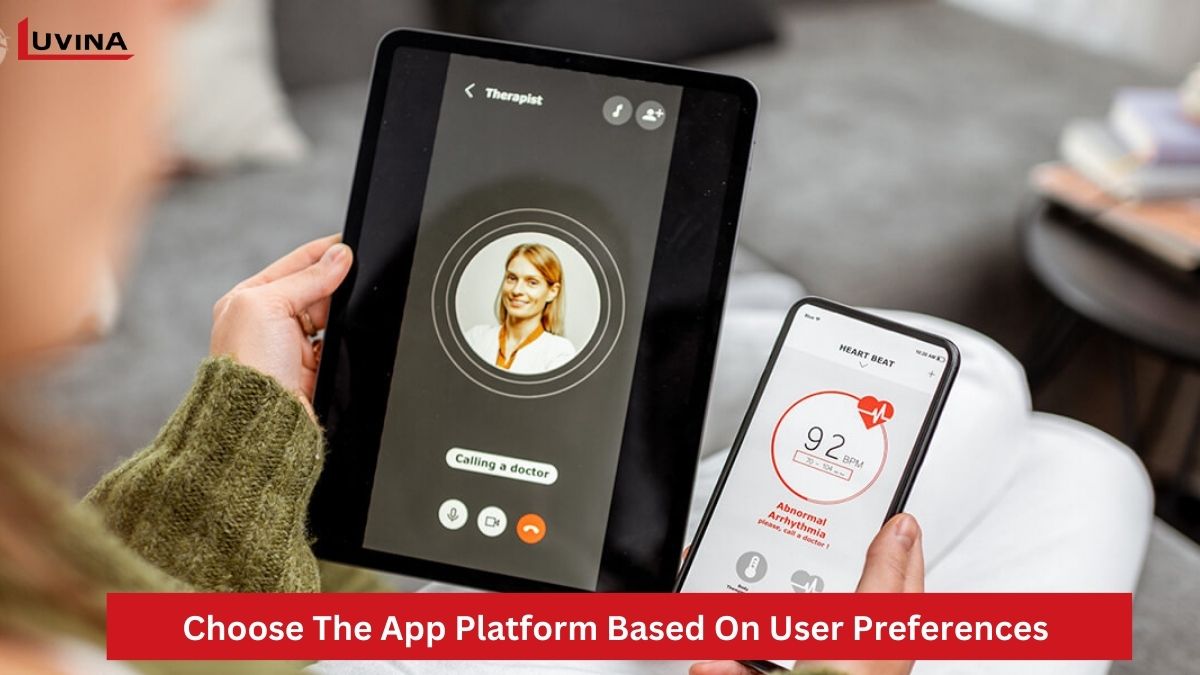
Step 5 – Choose a monetization strategy
Not all healthcare apps aim for monetization. Below are some suggestions for monetization strategies through healthcare app development:
- – Run advertisements
- – Membership subscriptions
- – Basic-premium model with access to premium services if paid
Step 6 – Design
The success of healthcare app development largely depends on whether the app’s design is consistent and intuitive. The app’s design must be user-friendly. Especially since healthcare apps prioritize user experience, you need to pay special attention to UX/UI design.
The app’s design should align with the preferences of end users. For example, older adults prefer apps with simple navigation and large fonts, while younger users prefer interfaces with many colors and features. Additionally, whether your users are general audiences or healthcare professionals also influences the design.
Step 7 – Ensure HIPAA compliance
Healthcare is a sensitive field that requires strict compliance with industry regulations. All healthcare apps must adhere to HIPAA regulations. HIPAA helps secure health information for both patients and service providers.
Step 8 – Build MVP
The MVP development process in healthcare app development should be fast and feasible. MVP helps your app enter the market faster and has a higher chance of success by collecting early feedback from users to improve promptly. When building an MVP, prioritize essential features to ensure they address the end-users’ needs.
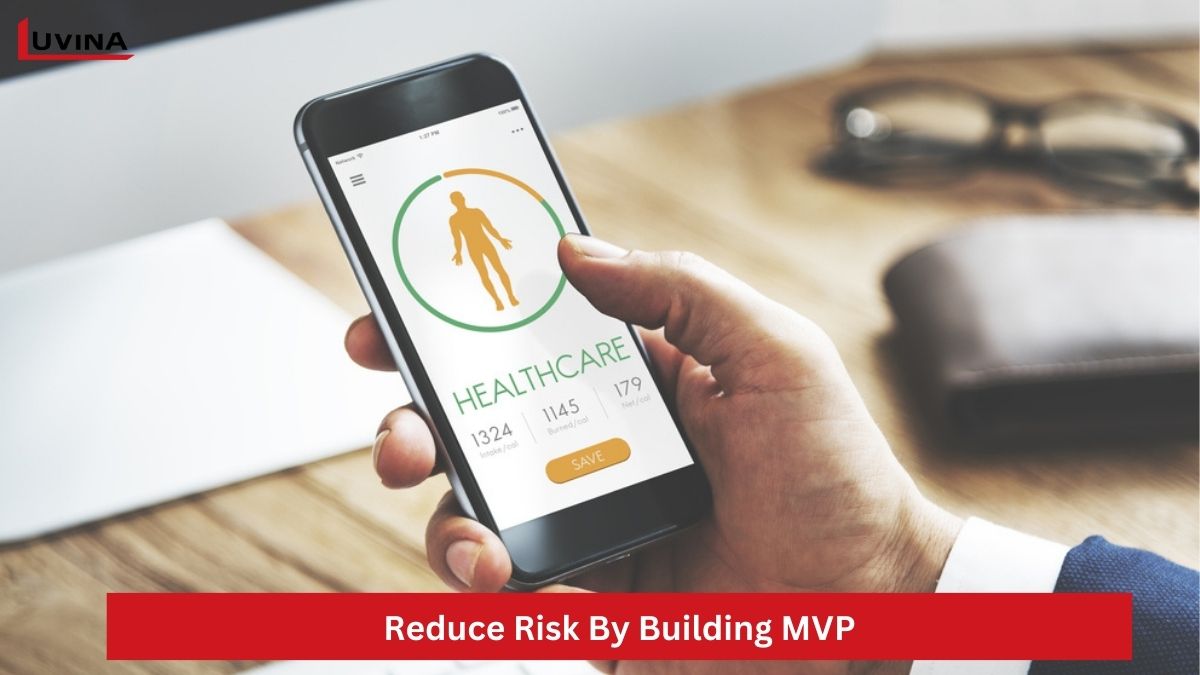
Step 9 – Testing
Testing is an indispensable step in healthcare app development services. In this step, you need to check everything about the app, including the interface, content, app functionality, and its performance in poor connectivity conditions. By conducting reasonable tests, you can save both time and money on healthcare app development.
Step 10 – Launch and update
After officially launching the app, you need to monitor its performance regularly. Additionally, continuous upgrades and maintenance are necessary to keep the app updated and maintain a competitive edge in the market.
Healthcare App Development Costs Average
Please be aware that developing a healthcare app will require at least USD 60,000. The typical cost of developing a mobile app for healthcare involves several elements, including platform, security level, UX/UI design, functionality, and more. Developing a healthcare app can take anywhere from three to eighteen months, and the typical cost will be between USD 60,000 and USD $300,000.
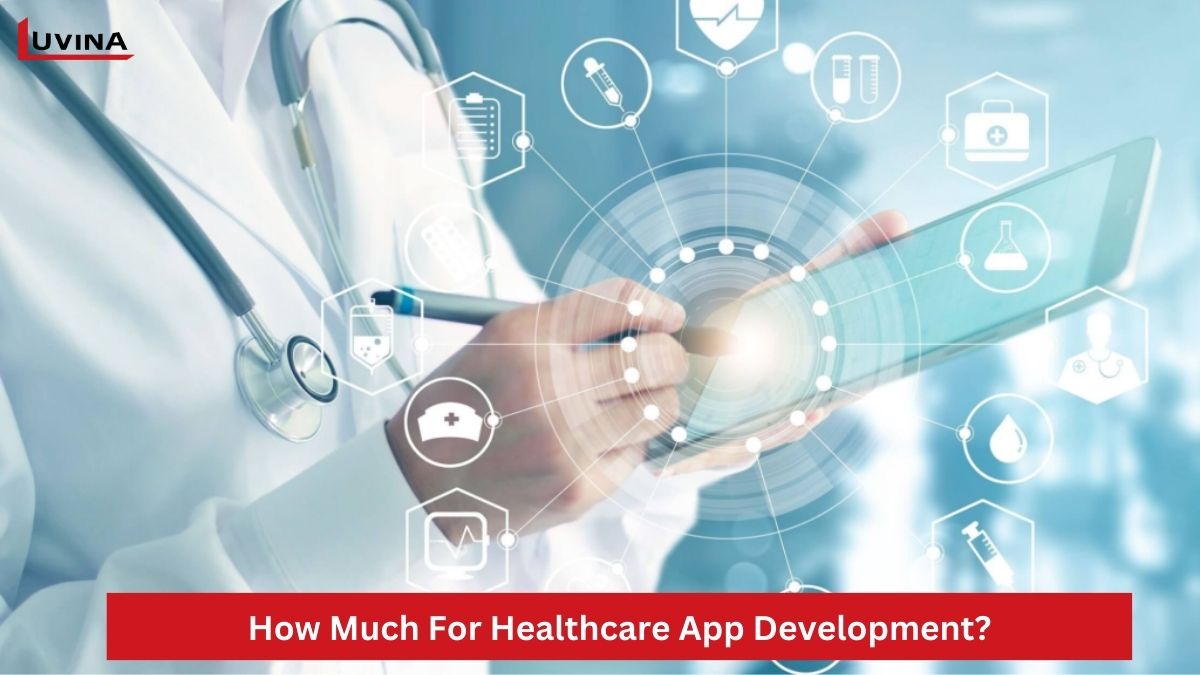
The cost of healthcare app development varies significantly based on the features of the app. Therefore, the more customization you require, the higher the cost. Additionally, your healthcare app will need continuous maintenance after launch. This ongoing maintenance and update will also contribute to increasing the overall development cost.
>> Also read: Healthcare IT Outsourcing: Services, Benefits, and Partner Selection
Conclusion
Above is a comprehensive overview of healthcare app development, with numerous challenges but also promising opportunities. If you have an idea for developing a healthcare app, I hope this article has helped you envision what needs to be done to best prepare for revolutionizing your healthcare services.
In case you need a partner to share the potential challenges you may encounter, feel free to reach out to Luvina and explore our healthcare development services. The Luvina team has expertise and experience in developing healthcare apps. If you need advice from experts for your project, Luvina is ready to assist you.
Related Posts:









Read More From Us?
Sign up for our newsletter
Read More From Us?
Sign up for our newsletter